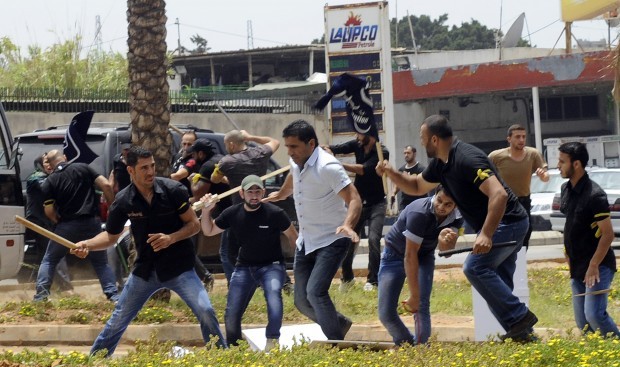
Hezbollah supporters clash with supporters of the Lebanese Option Party during a protest in front of the Iranian Embassy in Beirut, Lebanon, on Sunday, June 9, 2013. (AP Photo)
Riyadh, Asharq Al-Awsat—The Hezbollah movement and its controversial intervention in the conflict in neighboring Syria are not unanimously supported by Lebanon’s Shi’ite community, affirmed the head of Lebanon’s Free Shi’a Movement, Sheikh Mohammad Al-Hajj Hassan.
Speaking exclusively to Asharq AL-Awsat, Sheikh Hassan claimed that more than 300,000 Lebanese Shi’ites oppose Hezbollah and its policies, adding that this figure is rising after the Shi’ite militia revealed itself to be nothing more than “a party of fighters and murderers following its intervention in the Syrian crisis.”
The Free Shi’a Movement is a Lebanese political group allied with the March 14 Alliance and opposed to the predominantly Shi’ite March 8 Alliance, including Hezbollah and the Amal movement.
The head of the Free Shi’a Movement stressed: “Today, Lebanon is under the total domination of Hezbollah leader Hassan Nasrallah, who introduced 25,000 heavily armed soldiers into Syria—in full view of the Lebanese state and security apparatus, which had announced a policy of non-interference.”
Sheikh Hassan also informed Asharq Al-Awsat that Syrian refugees in Lebanon are being harassed by Hezbollah fighters. He said that he had received information that Hezbollah fighters have forcibly entered the homes of Syrian refugees, demanding identification documents.
He also claimed that Lebanese Shi’ite families do not support Hezbollah’s mission in Syria, emphasizing that they had been “deceived” by Nasrallah’s claims that the battle in Syria is an existential one for the Shi’ite community. He asserted that Nasrallah and his claims of a “jihadist takfirist” conspiracy against the Shi’ites have sought to incite sectarian strife in the country and region.
He said: “Hezbollah is a lackey to the Iranian authorities, and seeks to implement their projects in the region,” adding, “[Hezbollah’s] battle will not stop with Syria. It will damage relations between Shi’ites and their Sunni neighbors [in Lebanon].”
The head of the Free Shi’a Movement pointed out that they have had considerable security concerns since the beginning of a series of assassinations against “dissident” Shi’ites who do not agree with Hezbollah’s approach. The latest such killing was that of Hashim Salman—leader of the student section of the Option Party—who was shot and killed during an anti-war demonstration outside the Iranian Embassy in Beirut.
Sheikh Mohammed Al-Haj Hassan also told Asharq Al-Awsat that aid and services for displaced Syrians in the Hezbollah-dominated Baalbek region are sometimes withheld if they are revealed to be pro-revolution.
He indicated that “services provided to refugees in Lebanon have started to shrink. This will only serve to increase their suffering in the near future.”
The Free Shi’a Movement leader appealed to all social and voluntary bodies to send their envoys to refugee areas, adding: “The displaced Syrians who no longer enjoy even the most basic rights have suffered enough.”
